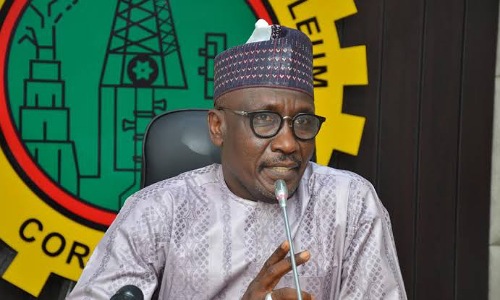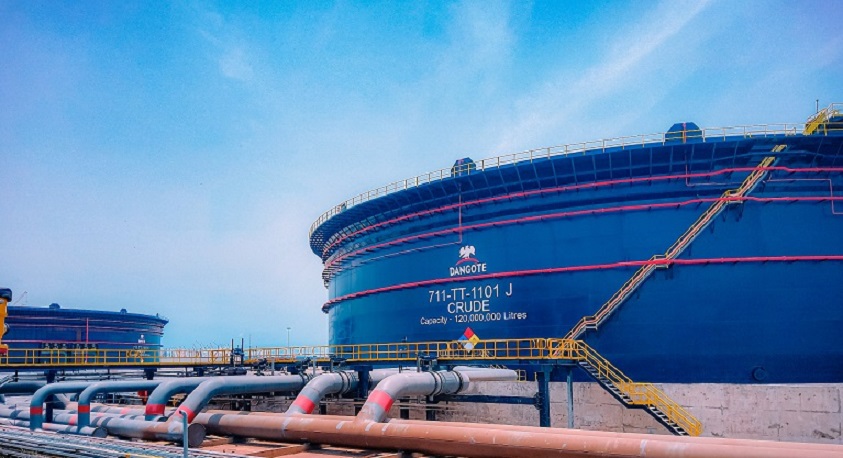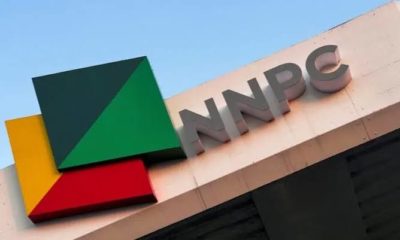NEWS
NNPC Given 7 Days To Account For ‘Missing’ Oil Revenues

The Socio-Economic Rights and Accountability Project (SERAP) has Issue an Urgent Call for the NNPC Ltd, CEO, Mele Kyari to account for alleged missing $2.04 Billion and N164 Billion in oil revenues.
The demand follows revelations in the Auditor-General of the Federation’s latest annual report, as detailed in a statement by the SERAP’s Deputy Director, Kolawole Oluwadare on February 17.
The SERAP urged Mr. Kyari to publicly identify and hold accountable those responsible for the missing oil funds.
The group advocates for imposing full surcharges on the implicated individuals and turning them over to relevant anticorruption agencies, in accordance with paragraph 3112(ii) of the Financial Regulations 2009, as endorsed by the Auditor-General’s recommendations.
The SERAP additionally implored the NNPC Limited boss to expedite the complete recovery and remittance of the alleged missing USD$2.04 billion and N164 billion into the Federation Account.
The organization highlighted the adverse impact of these missing oil revenues on the country’s fragile economy, accentuating the already elevated levels of deficit spending by the government.
The SERAP emphasized that without the complete recovery and remittance of the alleged missing USD$2.04 billion and N164 billion in oil revenues, the economic challenges could exacerbate.
The group warned that this situation may result in continued denial of access to essential public goods and services for Nigerians.
According to the SERAP, “the Auditor-General has for many years documented reports of disappearance of public funds from the NNPC. Nigerians continue to bear the brunt of these missing oil revenues.
“We would be grateful if the recommended measures are taken within 7 days of the receipt and/or publication of this letter. If we have not heard from you by then, SERAP shall consider appropriate legal actions to compel the NNPCL to comply with our requests in the public interest.
“Had the NNPCL and its subsidiaries accounted for and remitted the disappeared public funds into the Federation Account, it is likely that more funds would have been allocated to the fulfillment of economic and social rights, such as increased spending on public goods and services.
“The missing oil revenues have also impeded Nigerians’ ability to enjoy their economic and social rights, and denied them access to essential public goods and services, especially at the time of cost of living crisis in the country.
“Explaining the whereabouts of the missing public funds, naming and shaming those suspected to be responsible and ensuring that suspected perpetrators are brought to justice and the full recovery of any missing public funds would serve the public interest and end the impunity of perpetrators.”
“Nigerians have the right to know the whereabouts of the disappeared oil money. Ensuring transparency and accountability in the management of oil revenues would advance the right of Nigerians to restitution, compensation and guarantee of non-repetition.”
“According to the recently published 2020 audited report by the Auditor General of the Federation (AGF), the Nigerian National Petroleum Corporation (NNPC) failed to remit over USD$2 billion and N164 billion oil revenues into the Federation Account.”
“The Auditor-General fears that the money may have been diverted into private pockets, denying the government the funding needed to carry out its activities.”
“The NNPCL reportedly failed and/or refused to remit N151,121,999,966. The NNPCL without any justification deducted the money from the oil royalties assessed for 2020 by the Department of Petroleum Resources (DPR) now Nigerian Upstream Petroleum Regulatory Commission (NUPRC).
“The NNPCL has failed to account for the missing public funds. The Auditor-General wants the money recovered and remitted into the Federation Account.
“The NNPCL also failed to remit USD$19,774,488.15 collected as government revenue into the Federation Account. The Auditor-General wants the NNPCL to account for the money, recover and remit it into the Federation Account, and to hand over those suspected to be involved to the ICPC and the EFCC.
“The Nigerian Petroleum Development Company (NPDC) Ltd also reportedly failed to account for USD$2,021,411,877.47 and N13,313,565,786.49 of royalties collected from crude oil and gas sales and gas flare.
“The Auditor-General wants the public funds fully recovered and remitted into the Federation Account and for those suspected to be responsible for the missing public funds to be handed over to the ICPC and the EFCC.
“These grim allegations by the Auditor-General suggest a grave violation of the public trust and the provisions of the Nigerian Constitution 1999 [as amended], national anticorruption laws, and the country’s obligations under the UN Convention against Corruption.”
“The allegations have undermined the economic development of the country, trapped the majority of Nigerians in poverty and deprived them of opportunities.”
“SERAP is concerned that despite the country’s enormous oil wealth, ordinary Nigerians have derived very little benefit from oil money primarily because of widespread grand corruption, and the entrenched culture of impunity of perpetrators.
“Combating the corruption epidemic in the oil sector would alleviate poverty, improve access of Nigerians to basic public goods and services, and enhance the ability of the government to meet its human rights and anti-corruption obligations.
“SERAP notes that Section 15(5) of the Nigerian Constitution 1999 (as amended) requires public institutions to abolish all corrupt practices and abuse of power.
“Section 16(2) of the Nigerian Constitution further provides that, ‘the material resources of the nation are harnessed and distributed as best as possible to serve the common good.
“Section 13 of the Nigerian Constitution 1999 [as amended] imposes clear responsibility on the NNPCL to conform to, observe and apply the provisions of Chapter 2 of the constitution.
“Paragraph 3112(ii) of the he Financial Regulations 2009 provides that, ‘Where a public officer fails to account for government revenue, such officer shall be surcharged for the full amount involved and such officer shall be handled over to either the Economic and Financial Crimes Commission (EFCC) or the Independent Corrupt Practices and Other Related Offences Commission (ICPC).
“Nigeria has made legally binding commitments under the UN Convention against Corruption to ensure accountability in the management of public resources.
“Articles 5 and 9 of the UN Convention against Corruption also impose legal obligations on the NNPCL to ensure proper management of public affairs and public funds. These commitments ought to be fully upheld and respected.” it added
NEWS
NLC Shuts Down Ministry Of Mines Over 20-Year-Old Unlawful Dismissal
In a dramatic show of solidarity, members of the Nigeria Labour Congress (NLC) staged a picket outside the Federal Ministry of Mines and Steel Development’s headquarters in Abuja.
The protest was sparked by the ministry’s refusal to comply with a court order that demanded the reinstatement of Comrade Victor Ekpaha, who was dismissed from his position more than 20 years ago.
READ ALSO: Tariff Hike Protest: Telecoms Union Backs NLC’s Suspension Of Protest
The workers’ action resulted in the shutdown of the ministry’s operations, as they called for Ekpaha’s immediate reinstatement and the payment of his full salary, allowances, and other benefits for the over two decades that the case has been unresolved.
The NLC has expressed its determination to continue pressuring the ministry until the court ruling is respected and Ekpaha is fully compensated for the years of unpaid entitlements.
The union has also emphasized the broader issue of labor rights and justice, urging the government to address such longstanding grievances.
More to follow………………
NEWS
JUST IN: Dangote Refinery Cuts Petrol Price To N865 per

Dangote Refinery has announced a N15 reduction in its ex-gantry loading cost, bringing it down to N865 per litre from the previous price of N880.
The new price, confirmed by a pro forma invoice and verified by petroleumprice.ng, was communicated to customers in a notice on Thursday morning.
This price adjustment follows earlier reports that the 650,000 barrels-per-day refinery was expected to lower its petrol loading costs by the end of this week.
The reduction is expected to further drive down fuel prices in the country, providing some relief to consumers.
READ MORE: ECCIMA Applauds Dangote’s Impact On Nigeria’s Economy
Chinedu Ukadike, National Publicity Secretary of the Independent Petroleum Marketers Association of Nigeria (IPMAN), assured the public that the price drop aligns with the Federal Executive Council’s recent directive on the Naira-for-Crude agreement.
“We are confident that this price reduction will be beneficial for the Nigerian people,” Ukadike said.
In a related development, the Federal Executive Council has authorized the full implementation of the long-suspended Naira-for-Crude agreement with local refiners.
This policy aims to reduce Nigeria’s reliance on foreign exchange for petroleum imports and boost local refining capacity.
The Ministry of Finance released a statement following a meeting between Finance Minister Wale Edun and Dangote Refinery officials.
The statement emphasized that the Naira-for-Crude initiative is a long-term policy, not a temporary measure.
“The initiative is designed to support sustainable local refining, enhance energy security, and reduce the country’s dependency on foreign currency for petroleum products,” the Ministry’s statement read.
NEWS
BREAKING: HURIWA Urges Supreme Court To Dispense Justice Quick On Rivers Emergency Rule

It is the view of the pro-democracy and civil rights advocacy group, the Human rights Writers Association of Nigeria (HURIWA) that the apex court has been presented with an opportunity to redeem the waning public image of the Nigerian judiciary by the emergency rule declared in Rivers State.
Biztellers reports that the matter challenging President Bola Ahmed Tinubu’s proclamation of a state of emergency and the suspension of a sitting Governor of Rivers State, Siminilayi Fubara was instituted by some Nigerian governors.
The HURIWA, in a statement in Abuja on Wednesday by its National Coordinator, Comrade Emmanuel Onwubiko, noted that the Nigerian judiciary has never witnessed the kind of downturn, loss of public confidence and trust in the integrity to such a terrible extent that over 98 percent of Nigerians believed that President Tinubu has effectively pocketed the judiciary given that he was instrumental to the phenomenal rise of the current chief justice of Nigeria who was the justice that pronounced the then APC governorship candidate Hope Uzodimma who came 4th in the Imo State election as the winner thereby displacing the governor Emeka Ihedioha.
Ihedioha was elected on the platform of the Peoples Democratic Party (PDP).
ALSO READ: JUST IN: FEC Moves For Total, Continual Naira-For-Crude Deal
According to Onwubiko, besides, the Supreme Court’s recent highly biased and openly partisan judgment read by Justice Emmanuel Agim lambasting Governor Fubara and stopping the Central Bank of Nigeria from remitting the rightful allocations from the Federation Account to the coffers of the Rivers State government – a politically motivated ruling that led to the destabilisation of democratic structures of Rivers State including the unconstitutional suspension of Governor Fubara by President Tinubu.
The Rights group added that the inability of the Supreme Court to sanction Justice Emmanuel Agim for openly fraternising with the FCT Minister, Nyesom Wike at the recently held convocation ceremony of the University of Calabar shows the complicity and compromise with the executive arm of government by the Nigerian judiciary whose hierarchy is domiciled in the Supreme Court.
The HURIWA, therefore, affirmed that the time has now come for the world to see whether or not it is factually accurate the conspiracy theory that President Tinubu has the Nigerian judiciary in his pockets just as the Rights group said the decision by the Supreme Court of Nigeria in this matter brought by 11 governors of the PDP with a specific request for interpretation of the Constitution to ascertain if an elected president with same constitutional ways of impeachment just like the elected governor of the states, has the powers to unseat or unilaterally suspend a sitting governor like it was done to Gov Fubara.
Onwubiko maintained that the verdict on this case would be a verdict on the integrity of the Supreme Court of Nigeria and would be the last stroll that would break the camel’s back in terms of trusting the judiciary.
The HURIWA noted that the governors, in the suit marked: SC/CV/329/2025, predicated the summons on eight grounds.
The plaintiffs in the suit are Adamawa, Enugu, Osun, Oyo, Bauchi, Akwa Ibom, Plateau, Delta, Taraba, Zamfara, and Bayelsa States.
The plaintiffs urged the Supreme Court to determine if the President had the power to suspend a democratically elected structure of a state.
They also asked the apex court to determine if the way and manner the President pronounced the state of emergency declaration in Rivers State was not in contravention of the 1999 Constitution.
Amongst others, all 11 governors in the suit, filed through the states’ Attorney Generals, prayed the court to determine the following, “Whether upon a proper construction and interpretation of the provisions of Sections 1(2), 5(2), 176, 180, 188 and 305 of the Constitution of the Federal Republic of Nigeria 1999, the President of the Federal Republic of Nigeria can lawfully suspend or in any manner whatsoever interfere with the offices of a Governor and the Deputy Governor of any of the component 36 States of the Federation of Nigeria and replace same with his own unelected nominee as a Sole Administrator, under the guise of, or pursuant to, a Proclamation of a State of Emergency in any of the State of the Federation, particularly in any of the Plaintiffs States?
The HURIWA expressed belief that there is no provision of the extant Grund Norm that authorises the sitting President to suspend a sitting governor, and therefore reminded the Chief Justice of Nigeria, Kekere-Ekun that Nigerians will judge the Supreme Court and the judiciary by the kind of pronouncement the Supreme Court eventually makes in the aforesaid matter, especially with regards to the decision of the president to suspend a sitting governor.
“The judgment in this matter will determine whether Nigerians will support constitutional democracy or conclude that the judiciary has endorsed totalitarianism and dictatorship,” it added.
















